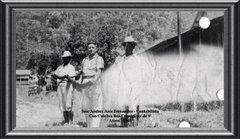Added regulation causes greater pervesion!
WINSTON-SALEM, N.C., Feb 11 (Reuters) - U.S. banks resentful about Washington interference on pay and other issues need to make clear they won't beg for a bailout when crisis hits, said former BB&T Corp Chief Executive and Chairman John Allison.
While they're at it, banks should consider overhauling their compensation systems anyway because they do not work well in the long term, Allison, 61, said in a wide-ranging interview about the U.S. banking system on Wednesday.
Allowing troubled banks to fail would regulate the market better then the government could, said Allison, who, since quitting as BB&T CEO in 2008 and chairman in 2010, has become a popular figure among critics of the U.S. government's financial industry bailout and the subsequent regulatory debate.
BB&T, the nation's tenth-largest bank, came through the credit crisis in a relatively healthy position vis-a-vis many of its southern regional rivals. Allison led the bank for nearly two decades, from 1989 to 2008, and was the architect of its growth from a small, North Carolina bank.
It took $3.1 billion from the Treasury's Troubled Asset Relief Program (TARP), but was one of the first banks to repay the money and has emerged as a consolidator in the troubled sector, buying the assets of failed Colonial Bank from the Federal Deposit Insurance Corp.
"I have no empathy for" banks that failed in the crisis, said Allison, now a business school professor at Wake Forest University .
Allison's comments come as regulators and the U.S. Congress debate financial industry rules. In recent months, critics have lambasted banks that paid record annual bonuses despite taking billions of dollars in federal bailouts during the crisis, and as broader U.S. unemployment remains near 10 percent.
Allison, who opposes the Obama administration's proposed regulatory reforms, says he has a simple solution.
"If [these banks] had been allowed to fail, these bankers wouldn't be getting paid right now," he said.
Allison's industry view is informed by his personal libertarian philosophy and reflected in his small, spartan office on the third floor of Wake Forest 's sprawling business and law school building.
His most prominent office decoration is a bookcase stacked with the works of Objectivist philosopher and author Ayn Rand, whose novels celebrate individualism and unfettered laissez-faire capitalism.
While Allison's outspoken anti-bailout views have fueled speculation about a career in politics, he poured cold water on that idea, and insisted he's more interested in trying to influence young minds through his current academic post.
Banks brought the government's scrutiny by making poor decisions leading up to the crisis, and giving executives badly structured pay packages, he said. Directors should take the blame for banker pay.
"Boards made significant operational errors," he said.
In the years leading up to the crisis, banks tied employee pay to short-term gains, rather than long-term health and stability of an institution, he said.
Compensation committees, he said, were "simply not comprehensive in their evaluation" of pay guidelines.
The result was bankers acting in their own interests, but not the long-term interest of shareholders and the companies, he said.
FAILING UP
The ever-present prospect of government rescue, he said, caused the biggest banks to act irresponsibly, taking larger risks than they might without implicit help from Uncle Sam.
If any bank becomes "too big to fail," Allison said the government must create a mechanism to break them up.
"I think it creates an oligopoly in the business long-term," by allowing such banks to survive, he said. "They've got a long-term competitive advantage and the market will figure that out."
Allison's solution is simple: Cut out what he views as badly focused regulations.
Instead, he wants to see banks retain more capital to reduce their leverage, and cut 90 percent of the current banking regulations.
"You've have a better capitalized industry which is by definition less risky, and banks can run on their own merits," he said.
In the final analysis, your attitude determines your effectiveness in everything, every time! LGL
.jpg)













